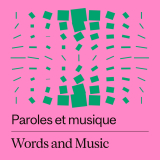Tenor Chenuka Lakwijaya (current BMus, Voice Performance) has lots to do as the president of Schulich’s Music Undergraduate Students’ Association, but organizing MUSA’s first-ever benefit concert—Music of Marginalized Voices—still makes for an especially exciting occasion. Featuring performances from Schulich undergraduates and even pieces composed by Schulich students and alums, the concert is “all about presenting underrepresented composers and works that speak to the struggles of marginalized communities” (MUSA socials). One hundred percent of the proceeds will support future community outreach at Schulich, bringing us more events like last year’s Arabic music youth concert with Elissa Nakhleh and Nour Saba and Frédéricka Petit-Homme's More than a Song: Gospel Music Workshop.
The concert is a great chance to hear talented young performers share pieces they love, and maybe discover a composer, sound, or style you didn’t know you needed in your life!
Born in Sri Lanka, Chenuka now calls the Vancouver area home. We caught up with him about the importance of intention and community, and how he connects music with the world at large.
How does music move you?
Even though music isn’t a panacea for all of the world's troubles, it never fails to bring reprise to those who yearn for it and inspire remarkable intellectual inquiry for those who crave a deeper understanding. I experience music as a waxing and waning throughout my body that carefully follows the contours of each phrase that I hear, play, and sing. I am always dancing when I hear music, even when I am sitting quietly in my bedroom.
What do you hope audiences experience at a Schulich concert?
Regarding the MUSA Benefit Concert specifically, I hope that audiences experience the richness of music that pushes the frontier of artistic creation, especially in ways that the Western classical tradition hasn’t explored before. I hope that students and faculty alike leave the concert with at least one morsel of something unfamiliar; a timbre, a lyric, a chord progression, or even a whole new composer. Above all else, I hope the audience experiences how diversification can be done in a safe and celebratory way.
What do you believe is a key feature in enabling the best kind of music-making and music-learning experience?
In order for a singer to learn a song, they have to know all the notes and rhythms in the accompaniment’s context and the text’s meaning. But for them to do the song justice and unearth its purest value, they have to make active decisions that act as a shuttle mediation between text, music, portrayal, and soul. In other words, how do we inspire people to ask a musical question and provide the right tools to get them to answer it with a contextually sound response? I believe that building confidence in intent enables us both to learn music deeply and perform it with a solid sense of why it is being performed. What do I mean by this? For someone to express themselves, there must be a degree of self-assurance, a validation that can allow them to make a choice and stick with it. If we build the strength and informedness in our intent, I feel that our music making will be made far more sensitive and justified.
We would love to know what composer (or artist, or ensemble, or album) you’d suggest we all go and listen to right now!
I have three wonderful suggestions: Begonia, Caroline Shaw, and Jeremy Dutcher!
How does music fuel your sense of community?
I learned how to read and sing music by my involvement in choirs. I have grown to understand the personal and cultural value of ensemble singing just as I do with solo singing. In a choir, the sense of community is almost tangible. It is a site of vulnerability and humility, produced by a shared intention of singing a perfectly tuned chord and a profoundly flexible sense of support for all choristers.
What is currently propelling you in your studies?
I strongly believe in the value of grounding one’s musical work firmly in the societal needs of one’s community. I also feel that students must be proactive in their musical education to experiment with and embrace the inherently multidisciplinary nature of music. I have realized over the years that there is great value in weaving different fields and disciplines in my music. I have allowed myself to explore the offshoots of music that delve into larger cultural structures, interpersonal relationships, etc. I am constantly inspired by the strength of music as a socio-cultural phenomenon, one which strives to understand its place in the different contexts it finds itself.
 MUSA Benefit Concert: Music of Marginalized Voices
MUSA Benefit Concert: Music of Marginalized Voices
February 14, 2023 at 7:30 p.m.
Tanna Schulich Hall


